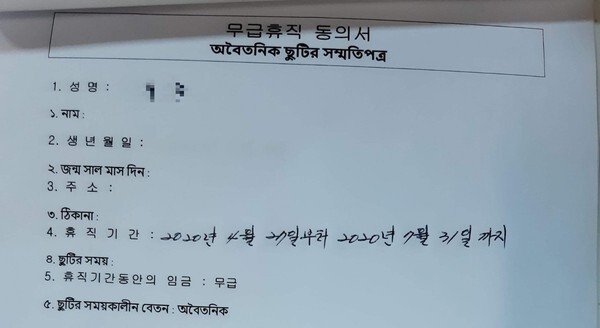hankyoreh
Links to other country sites 다른 나라 사이트 링크
Migrant workers forced to go on unpaid leave as manufacturers shut down due to COVID-19

In mid-April, a Bangladeshi worker (“K”) at a textile factory in Siheung, Gyeonggi Province, was getting ready to go home for the day when his boss handed him a piece of paper. It was a document, written in Korean and Bengali, that said, “I agree to go on unpaid leave at this company because of financial difficulties caused by the coronavirus outbreak from Apr. 27 to July 31, 2020.” K’s boss handed him a pen. While K was stunned to learn he wouldn’t be receiving any wages for three months, he ultimately had no choice but to sign the document.
K has been getting help from Shekh Al Mamun, vice president of the Migrants’ Trade Union. “Not only is it difficult to find a job under the present circumstances, but migrant workers who come to Korea on a work permit are [only able to change their workplace] a limited number of times, so they’re not likely to brush off their employers’ demands. Recently, we’ve seen a sharp increase in migrant workers being forced to take unpaid leave,” Al Mamun told the Hankyoreh over the phone on May 4.
As the COVID-19 pandemic batters South Korea’s manufacturing sector, the migrant workers who have been a critical source of labor at the country’s factories find themselves on the chopping block. Out of every 10 people employed in the manufacturing sector, one is a migrant worker. The biggest problem is that many of these workers don’t have employment insurance. Migrant workers aren’t automatically enrolled in that program unless they’re on a residency or marriage immigrant visa or have permanent residency.
Migrant workers make up 30 of 110 employees at a seat belt manufacturer in Siheung that recently suspended operations for two weeks. While the government’s “employment maintenance” subsidies allow the company to pay its workers during the shutdown, migrant workers aren’t eligible for that scheme. The problem is that the subsidies are calculated according to the number of employees enrolled in employment insurance. “We’ve agreed to call in the migrant workers first whenever we get an order, no matter how small. While operations are on hold, however, they’ve basically been told to fend for themselves,” said a member of the company’s labor union.
Some migrant workers complain that they haven’t received shutdown benefits despite being enrolled in employment insurance. Their employers may be taking advantage of the crisis to put off paying their wages.
A Nepalese worker at a plastic parts company in Paju, Gyeonggi Province, was unilaterally told in mid-April not to show up at the factory for two weeks. “My boss suddenly told me to take two weeks off and said he couldn’t give me any shutdown pay. Considering that I’m enrolled in employment insurance and that I always pay my income taxes, I don’t understand why I can’t receive shutdown pay,” the worker said.
“When an employer is responsible for shutting down its operations, it’s obligated to pay at least 70% of the wages of workers who don’t agree to unpaid leave. These companies appear to have taken advantage of migrant workers’ ignorance of that,” said Choi Seung-hyeon, a labor attorney for the law firm Sam.
By Lee Jae-yeon, staff reporter
Please direct comments or questions to [english@hani.co.kr]

Editorial・opinion
![[Column] Season 2 of special prosecutor probe may be coming to Korea soon [Column] Season 2 of special prosecutor probe may be coming to Korea soon](https://flexible.img.hani.co.kr/flexible/normal/500/300/imgdb/original/2024/0426/3317141030699447.jpg) [Column] Season 2 of special prosecutor probe may be coming to Korea soon
[Column] Season 2 of special prosecutor probe may be coming to Korea soon![[Column] Park Geun-hye déjà vu in Yoon Suk-yeol [Column] Park Geun-hye déjà vu in Yoon Suk-yeol](https://flexible.img.hani.co.kr/flexible/normal/500/300/imgdb/original/2024/0424/651713945113788.jpg) [Column] Park Geun-hye déjà vu in Yoon Suk-yeol
[Column] Park Geun-hye déjà vu in Yoon Suk-yeol- [Editorial] New weight of N. Korea’s nuclear threats makes dialogue all the more urgent
- [Guest essay] The real reason Korea’s new right wants to dub Rhee a founding father
- [Column] ‘Choson’: Is it time we start referring to N. Korea in its own terms?
- [Editorial] Japan’s rewriting of history with Korea has gone too far
- [Column] The president’s questionable capacity for dialogue
- [Column] Are chaebol firms just pizza pies for families to divvy up as they please?
- [Column] Has Korea, too, crossed the Rubicon on China?
- [Correspondent’s column] In Japan’s alliance with US, echoes of its past alliances with UK
Most viewed articles
- 1‘We must say no’: Seoul defense chief on Korean, USFK involvement in hypothetical Taiwan crisis
- 2N. Korean delegation’s trip to Iran shows how Pyongyang is leveraging ties with Moscow
- 3[Column] Season 2 of special prosecutor probe may be coming to Korea soon
- 4‘Weddingflation’ breaks the bank for Korean couples-to-be
- 5[Column] Has Korea, too, crossed the Rubicon on China?
- 6[Editorial] New weight of N. Korea’s nuclear threats makes dialogue all the more urgent
- 7[Reportage] On US campuses, student risk arrest as they call for divestment from Israel
- 8Korea sees more deaths than births for 52nd consecutive month in February
- 9[Column] Park Geun-hye déjà vu in Yoon Suk-yeol
- 10[Guest essay] The real reason Korea’s new right wants to dub Rhee a founding father